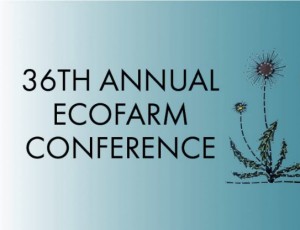 November 24, 2015 – It’s almost that time of year again, when organic food buffs young and old take a winter sojourn to the scenic Asilomar Conference Grounds in Pacific Grove for the annual EcoFarm Conference.
November 24, 2015 – It’s almost that time of year again, when organic food buffs young and old take a winter sojourn to the scenic Asilomar Conference Grounds in Pacific Grove for the annual EcoFarm Conference.
This year, the four-day series of informative workshops and bus tours, inspiring talks as well as dances and other social gatherings will take place January 20-23. The theme, “Regenerating Our Lands and Water,” will be explored with the latest research, policy and methodology available.
In addition to farmers, the event attracts teachers, activists, scientists, students, chefs and consumers—basically anyone thirsty for knowledge about ecology and helping our planet will find value in attending.
Still, executive Director Ken Dickerson emphasizes that the driving force behind EcoFarm’s power remains “the deep rooted history of being a farmer-to-farmer exchange. Farmers are resources for themselves and among themselves, it’s their shadow in the field that makes the difference. They gather the experience, we just give farmers the access to their own resources.”
The formula has been successful. Indeed, Ecofarm has grown to become the place in the region for hearing from a broad spectrum of leaders and for cultivating real solutions that can be brought home and put them to the test.
In fact, many of what may seem like household terms (at least around here) today started with farmer observation and discussion at EcoFarm.
“The recognition of cover crops and compost for fertility and pest management are breakthrough revelations in the world of agriculture, and so much of this has emerged 5, 10, 15 years ahead of it being reported anywhere else,” says Dickerson. He adds that “EcoFarm has been working with these concepts, sharing research, many years ahead of the status quo curve.”
Pre-conference events are very specifically geared toward implementing new practices, and the “Building Healthy Soil Ecology: Investing in Your Farm’s Bottom Line” will bring farmers, orchardists, and researchers together to work through new soil science insights. Dickerson explains that the drive behind this intensive pre-conference is “recognizing that the wisdom is in the practitioner, and the farmer is that practitioner.” This offers “practical, how-to information and asks the fundamental question, ‘what can you really do to increase the health of your soil?’” Because ultimately, he adds, “soil health equals plant health, plant health equals healthy food, healthy food equals healthy people.”
Also, since we now know that healthy soil retains moisture better, it is especially crucial to examine during drought conditions. “Soil is the solution to global warming, eliminating erosion, to having the best conditions to adapting to drought, and to create the foundation of a food and farming system that does not depend on chemicals,” says Dickerson.
That is just the beginning! Over seventy different workshops are on tap, uniquely tailored to fuel participants with the energy to effect change. The range is wide, from very technical and targeted to farmers, to more theoretical and societal. These are just a few of the topics:
- Building a Socially Just Local Food System
- Love Your Body Like You Love Your Farm
- Yes, You Can!…Make Retirement and Succession a Reality
- Organic Textiles from Field to Tee
- Maximizing Value from Excess Harvest to Benefit Communities
- The Bloom Boom: Growing and Marketing Cut Flowers
- Organic Seed Activism: A New Roadmap
- Running a Successful Produce Department
- Wise Words from Well Seasoned Farmers
- Badass Tractor Mechanic 101: Keep Your Old Tractor in the Field
- Got Marijuana? Make it Organic
- Integrating Animals in Orchards, Vineyards and Row Crops
There are also several inspiring Plenary sessions planned, including a keynote from Dr. Daphne Miller, whose latest book Farmacology: What Innovative Family Farming Can Teach Us About Health and Healing looks at connecting where and how our food is grown to our health. She synthesizes clinical, ecological and anthropological approaches into a holistic perspective, and argues that we can discover “medicine” in a variety of sources.
What links every discussion group, panel and workshop, the core to what EcoFarm is all about, according to Dickerson, is “triple bottom line agriculture”. This concept derives from a somewhat new B Corporation model tax bracket and “is basically saying that your company is committed to finding the balance between people, profit and the planet.” He explains that while the conference certainly provides vast amounts of technical information for farmers and valuable resources and discussions for retailers and producers, “our main focus is to make sure that where it all starts and what it’s all about is this triple bottom line. We want to make sure that the profit isn’t the final guide to the decision-making. We believe that is the largest problem in the system, that the economic impact is the first thought. It is currently a system not interested in the effects of external costs.”
Aside from the brainwork, there is a lot of fun in store to blow off some steam, and part of what makes EcoFarm so well rounded. Dickerson’s favorite is the talent show, which happens every other year.
“We don’t really need to be entertained by some sort of entertainment machine, we have it within ourselves,” he says of the often hidden talents within the farming community. Dances, seed swaps, beer and wine tastings, an awards banquet, and of course, lots of really good organic food. Don’t miss it, register by December 6th for early bird rates.
About the author
Amber Turpin is a freelance food and travel writer based in the Santa Cruz Mountains.
- Amber Turpinhttps://www.ediblemontereybay.com/author/aturpin/
- Amber Turpinhttps://www.ediblemontereybay.com/author/aturpin/
- Amber Turpinhttps://www.ediblemontereybay.com/author/aturpin/
- Amber Turpinhttps://www.ediblemontereybay.com/author/aturpin/


